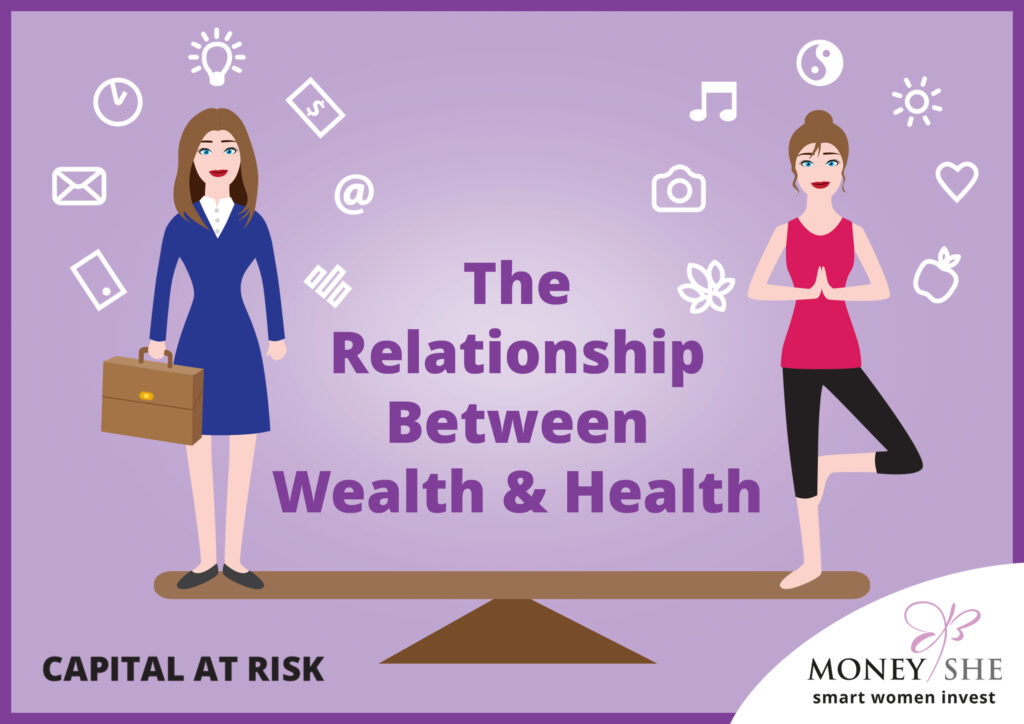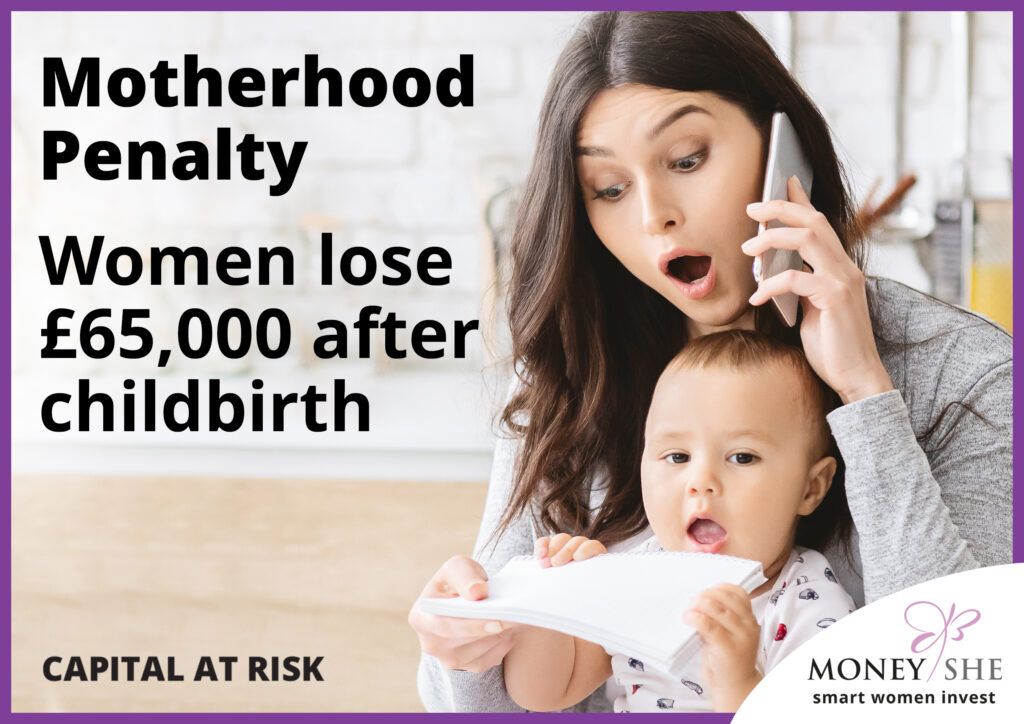21st November 2025
We often talk about money as if it sits in its own box – separate from our wellbeing, our stress levels, our relationships and our long-term health.
But the truth is simple and backed by a growing body of research:
Your wealth affects your health. And for women in the UK, the gap is getting wider.
A new report from the Institute for Fiscal Studies (IFS) highlights a worrying trend: depressive symptoms have risen sharply among women in their late 50s and early 60s since the mid-2010s, especially among the least wealthy third.
Poor health in these crucial years isn’t just a quality-of-life issue. It’s one of the strongest predictors of women leaving the workforce early – with big consequences for income, pension wealth, and long-term security.
At MoneyShe, we’ve always said investing isn’t just about growing wealth – it’s about building resilience. That has never been truer than now.
The Reality: Women Enter Their 50s and 60s With Bigger Health Burdens Than Men
The IFS research shows:
- Over the last 20 years, men’s overall health in their late 50s and 60s has modestly improved.
- Women’s health has not, and remains consistently worse on average.
- In 2002–03, 7% of men and women aged 55–64 reported six or more long-term health conditions.
- By 2023–24, almost four times as many women as men reported six or more health problems.
This is alongside well-known gender health inequalities:
- Women are more likely to experience chronic pain and autoimmune conditions.
- Women carry the bulk of unpaid caregiving.
- Perimenopause and menopause – still poorly understood or supported – collide with peak career and earnings years.
- The percentage of women diagnosed with metastatic (late-stage) breast cancer at their initial diagnosis is on the rise across all age groups, including women under 40, with Global estimates project a 38% rise in breast cancer cases and a 68% rise in deaths by 2050 if current rates continue.
The result? Many women reach mid-life struggling with physical, mental and emotional load – and often with fewer financial buffers.
When Poor Health Becomes a Wealth Gap
Health issues push women out of work early
Having to take say on or two years off work due to ill health or leaving work before state pension age means:
- Lost earnings
- Higher outgoings as can lead to higher care costs for those you normally look after, especially if you’re a sandwich carer, higher energy/heating and nutrition/medicine costs
- Lower pension contributions
- Reduced long-term financial security
Declining mental health is an emerging financial risk
The IFS data shows depressive symptoms rising fastest among women with the least wealth, and the Money & Mental Health Policy Institute reports people with mental health challenges are:
- 3x more likely to be in difficult levels of debt
- More likely to avoid financial decisions altogether
- Prone to leaving money “unmanaged” due to anxiety and feeling overwhelmed
Managing your money supports managing your health
Research from the Health Foundation shows that financial security:
- Reduces chronic stress
- Improves sleep
- Increases life expectancy
- Helps people stay in work longer
Money isn’t everything – but it is one of the most powerful preventative health tools.
A New Headwind: Inflation, Real Returns & the Tough Budget Ahead
Latest data (19 Nov 2025) shows UK inflation fell to 3.6% in October, down from 3.8% (food inflation remains high but is also down from 5.1% in August to 4.5% in September). But the wider economic backdrop remains fragile, and the 26 November UK Budget is expected to be tough on households as the Chancellor seeks to plug the fiscal black hole and ignite economy growth.
This all matters for women’s financial wellbeing because:
Inflation reduces the real value of your money
If inflation sitting between 3.8 – 4% then:
- A 4% return on your investments isn’t really 4%
- After inflation and fees, your real return might be close to 0%
- Savings sitting in cash lose value every year
This is especially dangerous for women who:
- Already hold more money in cash than men
- Tend to delay investing
- Have smaller pension pots
- Live longer (so need more money in retirement)
The Autumn Budget may tighten household finances
With weak economic growth, The Chancellor may opt for:
- Tax rises
- Spending cuts
- Reduced support
- Slower uprating of benefits or tax thresholds
Food inflation is still 4.9%, meaning the essentials in everyday life are rising faster than headline inflation. For women already navigating health pressures, caring roles and financial balancing acts, this squeeze hits hard.
What does this all mean?
It means the financial environment is not just uncertain – it is unforgiving.
The margin for error is smaller, and the importance of investing wisely is bigger.
Practical Steps to Strengthen Both Your Health and Wealth
- Start building your financial safety net early – Regular investing contributes to financial resilience later. Starting with £10,000 then putting away £200 per month at a 5% annual return becomes £109,675.64 after 20 years – thanks to the magic of compounding!
- Increase pension contributions if you can – Women retire with about 35% less pension wealth than men. Small uplift amounts when you can, make a big difference over time.
- Don’t rely on cash savings – Cash loses buying power when inflation is high – as it is set to be for the foreseeable future. A diversified, low-cost investment strategy protects your real (inflation-adjusted) return.
- Take menopause seriously – Hormonal changes can affect productivity, sleep and mood. Early support – medically, at work and at home – can help protect your earning power.
- Get help if mental health is impacting your financial life – This is far more common than people admit. Speaking to your GP, employer or a mental health professional can protect you now, but also your financial future.
At MoneyShe We Believe Financial Security Is Women’s Preventative Medicine
Women with strong financial foundations:
- Experience less chronic stress
- Are better protected from economic shocks
- Are more prepared if/when illness strikes
- Are less vulnerable to financial/economic abuse
- Enter retirement healthier and more secure
We design investment portfolios that are:
- Low-cost
- Transparent
- Diversified
- Professionally managed
- Built to weather inflation, volatility and life’s unexpected moments
We take the hard work out of investing so you can focus on living, thriving and looking after your health.
Your Future Self Depends on Today’s Financial Choices
The health-wealth gap for women isn’t closing on its own. Be proactive and improving your knowledge, understanding and confidence around money will strengthen both your financial and physical wellbeing. Make your financial wellbeing part of your healthcare plan.
IFS Report: Health, wealth and employment in the run-up to state pension age
Start now. Invest in yourself. Build the financial resilience to thrive, on your terms.
🟣 Join the MoneyShe community today and take the first step toward reclaiming your financial future.
👉 Explore our tools and start investing now
Important Notice:
This is general information only and not financial advice. The value of investments can go down as well as up, so you could get back less than you invest. It is therefore important that you understand the past performance is not a guide to future returns. None of the trading brands of SCM Private, MoneyShe or SCM Direct – give personal advice based on your circumstances. We aim to provide investors with understandable information so they can make fully informed decisions. If you are unsure about the suitability of our investment portfolios, please contact an independent financial adviser.






